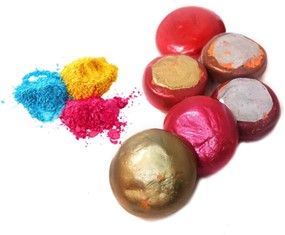Gulaal Gota | 28 Mar 2024
Why in News?
In Jaipur, Rajasthan, the age-old tradition of celebrating Holi continues. This celebration involves the practice of "Gulaal Gota," a unique tradition dating back around 400 years.
What is Gulaal Gota?
- History:
- Gulaal Gota is a small ball made of lac, filled with dry gulaal, and weighs around 20 grams when filled.
- Lac is a resinous substance that is secreted by certain insects. The female scale insect is one of the sources of lac.
- To produce 1 kg of lac resin, around 300,000 insects are killed. The lac insects also yield resin, lac dye and lac wax.
- It is used in various applications, including the production of lac bangles.
- Lac is a resinous substance that is secreted by certain insects. The female scale insect is one of the sources of lac.
- Gulaal Gota is a small ball made of lac, filled with dry gulaal, and weighs around 20 grams when filled.
- The process of making Gulaal Gotas involves boiling lac in water to make it flexible, shaping it, adding colour, heating it, and then blowing it into a spherical shape with the help of a blower called "phunkni".
- Raw Materials and Artisan Community:
- Lac, the primary raw material for Gulaal Gota, is sourced from Chhattisgarh and Jharkhand.
- Gulaal Gotas are made by Muslim lac makers, known as Manihaars, in Jaipur, who learned lac-making from Hindu lac makers in Bagru, a town near Jaipur.
- Historical Significance and Economic Aspects:
- Established in 1727 by Sawai Jai Singh II, Jaipur, known for its vibrant culture, dedicates a lane at the Tripoliya Bazaar to the Manihaar community.
- Named "Manihaaron ka Raasta," this lane remains a hub for selling lac bangles, jewellery, and Gulaal Gota, preserving the city's artistic legacy to this day.
- In the past, kings would ride through the city on elephant backs on Holi and toss Gulaal Gotas to the public, and the erstwhile royal family ordered Gulaal Gota at its palace for the festival.
- Established in 1727 by Sawai Jai Singh II, Jaipur, known for its vibrant culture, dedicates a lane at the Tripoliya Bazaar to the Manihaar community.
- Challenges and Future Prospects:
- The demand for lac-only bangles has fallen, as Jaipur has become a hub of factories producing cheap, chemical-based bangles.
- The government of India has provided "artisan cards" to Lac Bangle and Gulaal Gota makers, allowing them to avail benefits from government schemes.
- Some Gulaal Gota makers have demanded a Geographical Indication (GI) tag to safeguard their product against imitation and boost awareness of its location-specific exclusivity.
Unique Holi Traditions Across India:
- Holla Mohalla in Punjab:
- Integral to Sikh tradition, Holla Mohalla is observed in Anandpur Sahib with martial arts demonstrations, poetry, and kirtans.
- Phaguwa in Bihar:
- Phaguwa, also known as Phagwah or Phalgunotsava, celebrates the arrival of spring and the harvest season.
- Folk songs and Holika Dahan precede the colourful festivities, creating a vibrant environment.
- Phaguwa, also known as Phagwah or Phalgunotsava, celebrates the arrival of spring and the harvest season.
- Lathmar Holi in Uttar Pradesh:
- Celebrated in Barsana and Nandgaon, the hometowns of Radha and Lord Krishna, Lathmar Holi reenacts a playful tale of Lord Krishna teasing Radha.
- Women playfully hit men with sticks, symbolising the enduring love between Radha and Krishna.
- Celebrated in Barsana and Nandgaon, the hometowns of Radha and Lord Krishna, Lathmar Holi reenacts a playful tale of Lord Krishna teasing Radha.
- Yaoshang in Manipur:
- A blend of Hindu and Manipuri traditions, Yaoshang features the Thabal Chongba dance (folk dance from Manipur) and sports competitions.
- The festival is generally celebrated at the same time as Holi.
- Ukuli in Kerala:
- Celebrated by the Kudumbi and Konkani communities, Ukuli in Kerala features music, dance, and turmeric colours.
- Boat races add excitement to the festivities, while praises of Lord Krishna resonate throughout the celebrations.
- Celebrated by the Kudumbi and Konkani communities, Ukuli in Kerala features music, dance, and turmeric colours.

